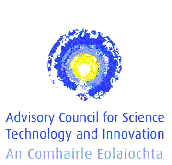| 2006 |

|
YEAR BOOK |
Forf�s
|
The Advisory Council for Science, Technology and Innovation
|

The Advisory Council for Science, Technology and Innovation (The Science Council) is the Government's high-level advisory body on science, technology and innovation (STI) policy issues. It serves as the primary interface between stakeholders and policy policymakers in the STI arena. Established by Government in April 2005 under Forf�s legislation, it succeeds the Irish Council for Science Technology and Innovation (ICSTI). Forf�s provides research and administrative support to the new Advisory Council for Science, Technology and Innovation (Science Council).

The Council operates within the context of the arrangements put in place by government in June 2004 for the coordination and governance of STI matters, which include the Cabinet Committee and the Inter-Departmental Committee for STI and the Office of the Chief Science Adviser.
The Council's Work Programme was approved by the Inter-Departmental Committee (IDC) on STI in September 2005 and includes the following priority areas:
-
Advising the Inter-Departmental Committee on STI on issues relating to the formulation of the national
Strategy for STI 2006-2013.
The Strategy, launched by Government in June implements the National R&D Action Plan
Building Ireland's Knowledge Economy � The Irish Action Plan to Promote Investment in R&D to 2010
(Forf�s, August 2004).
-
Examining issues and policy requirements required to promote further
collaboration between enterprise and higher education
in Ireland.
-
Developing a vision and strategy to drive a step change in the level, quality and commercialisation of
health research
leading to increased economic activity and wealth creation and enhanced patient care.
-
Identifying where
biotechnology
is enabling new opportunities for growth and employment and the areas where Ireland can develop competitive advantage.
The Council is currently conducting a study into collaboration between enterprise and academia. What will the study involve?
In modern economies closer interaction between public knowledge institutions and enterprise is increasingly important. One of the reasons for this is the increasing global competition which forces companies to specialise and strengthen their core areas. By working closely with the knowledge institutions companies gain access to the new knowledge they need as well as the latest technologies. Interacting in relation to research and development is the most important, but not the only, medium for achieving this goal.
In this context the Council has undertaken a study of the relationship between enterprises and higher education institutions, both here and in a small number of comparable countries, in order to understand better the driving forces behind such relationships and to determine whether changes are needed in critical areas influencing these relationships.
Health Research is a key priority area for the Science Council and one which affects everyone in Ireland. Why is this field so important and what do you hope to achieve in this area?
The intent is both to enhance the health of the population and to create a revenue stream through effective commercialisation of the intellectual property created through research and innovation. A key element of this vision is to have better trained and informed clinicians providing the best possible health care to our people enabled by the latest knowledge regarding state of the art therapies and technological developments. A secondary benefit will be to create a large force of highly trained health care scientists and technicians who will enhance national competitiveness and enterprise development.
Biotechnology is another key focus area for the Council. What are the key objectives for the development of the biotechnology industry in Ireland?
Biotechnology has grown to become one of Ireland's most important business sectors and an area of strong growth potential for the future. The cumulative investment in developing a national biotechnology capability now exceeds �1 billion. This funding has come mainly from Science Foundation Ireland, the Higher Education Authority, Enterprise Ireland, the Health Research Board and the European Commission. While funding remains at a relatively low level by international standards this, nevertheless, represents a major commitment in the national context. If this level of investment is to be maintained in the long term it will need to demonstrably lead to substantially enhanced capability within companies of all sizes and in all sectors to develop innovative new products and processes with which to profitably go to market.
In the future the capacity to absorb the emerging national biotechnology capability could be developed by establishing a series of sector-specific industry-led networks. Each network would involve relevant research groups from the universities and institutes of technology, companies capable of exploiting the output of these research groups, as well as relevant expertise in areas such as intellectual property protection and transfer. These networks should be allowed to develop in a manner that is relevant to the stage of development of the sector in question, but all clusters should be measured for performance against agreed parameters.
Contact details: Nicola Faulkner,
Communications, Forfas,
Wilton Tce, Dublin 2.
Tel: +353 1 6073162
Web: www.sciencecouncil.ie